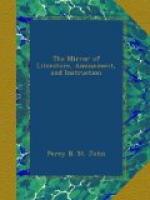of adversity, had lost its zest, and I was thinking
whether time was to be better fought off by a plunge
to the bottom of the Thames, or by the muzzle of one
of Manton’s hair-triggers—I was
saved by a plunge into the King’s Bench.
There life was new, friendship was undisguised, my
coat was not an object of scorn, my exploits were
fashion, my duns were inadmissible, and my very captors
were turned into my humble servants. There, too,
my nature, always social, had its full indulgence;
for there I found, rather to my surprise, nine-tenths
of my most accomplished acquaintance. But the
enemy still made his way; and I had learned to yawn,
in spite of billiards and ball-playing, when
the
Act let me loose into the great world again.
Good-luck, too, had prepared a surprise for my
debut.
I had scarcely exhibited myself in the streets, when
I discovered that every man of my
set was grown
utterly blind whenever I happened to walk on the same
side of the way, and that I might as well have been
buried a century. I was absurd enough to be indignant;
for nothing can be more childish than any delicacy
when a man cannot bet on the rubber. But one
morning a knock came to my attic-door which startled
me by its professional vigour. An attorney entered.
I had now nothing to fear, for the man whom no one
will trust cannot well be in debt; and for once I
faced an attorney without a palpitation. His intelligence
was flattering. An old uncle of mine, who had
worn out all that was human about him in amassing
fifty thousand pounds, and finally died of starving
himself, had expired with the pen in his hand, in the
very act of leaving his thousands to pay the national
debt. But fate, propitious to me, had dried up
his ink-bottle; the expense of replenishing it would
have broken his heart of itself; and the attorney’s
announcement to me was, that the will, after blinding
the solicitor to the treasury and three of his clerks,
was pronounced to be altogether illegible.
The fact that I was the nearest of kin got into the
newspapers; and in my first drive down St. James’s,
I had the pleasure of discovering that I had cured
a vast number of my friends of their calamitous defect
of vision. But if the “post equitem sedet
atra cura” was the maxim in the days of Augustus,
the man who drives the slower cabriolet in the days
of George the Fourth, cannot expect to escape.
The “hour too many” overtook me in the
first week. On one memorable evening I saw it
coming, just as I turned the corner of Piccadilly;
fair flight was hopeless, and I took refuge in that
snug asylum on the right hand of St. James’s
Street, which has since expanded into a palace.
I stoutly battled the foe, for I “took no note
of time” during the next day and night; and when
at last I walked forth into the air, I found that
I had relieved myself of the burden of three-fourths
of my reversion. A weak mind on such an occasion
would have cursed the cards, and talked of taking care




